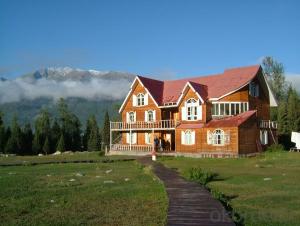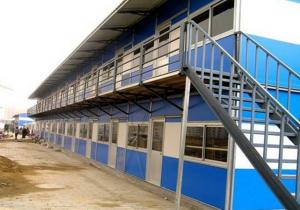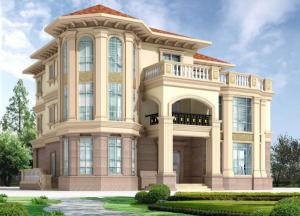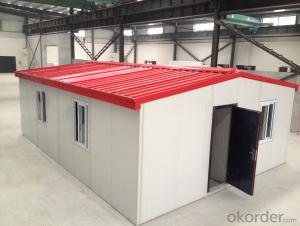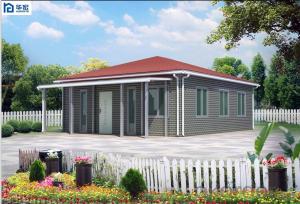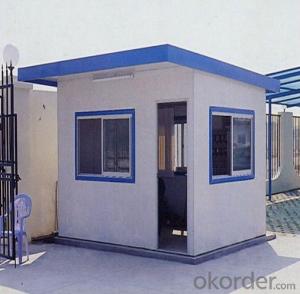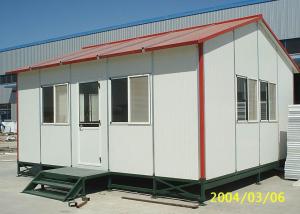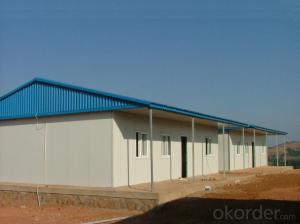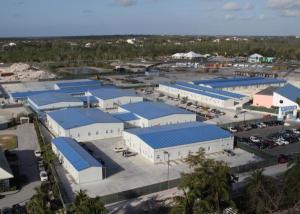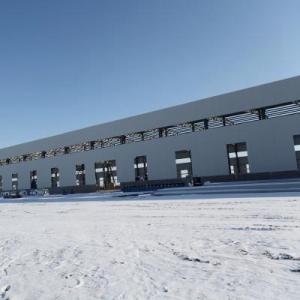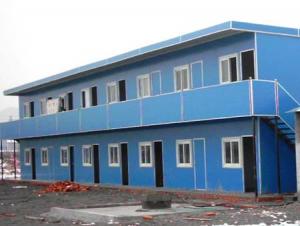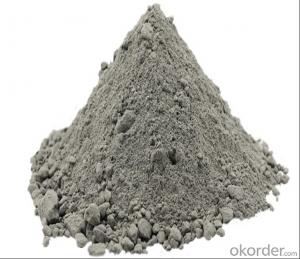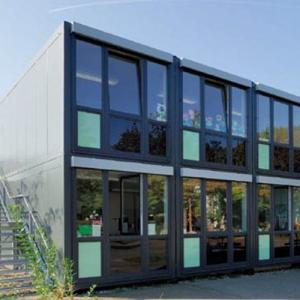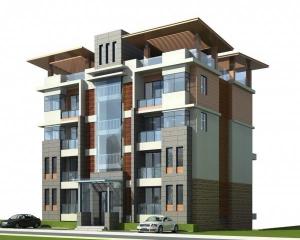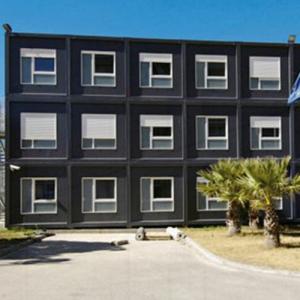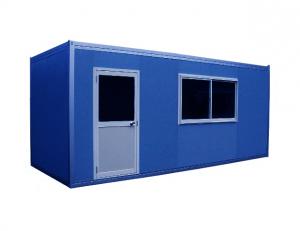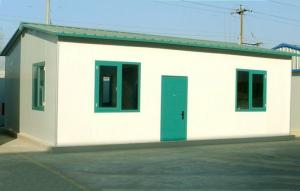villa wooden house
- Loading Port:
- China Main Port
- Payment Terms:
- TT OR LC
- Min Order Qty:
- -
- Supply Capability:
- -
OKorder Service Pledge
OKorder Financial Service
You Might Also Like
wooden villa house
New Designed Two-story Prefabricated Living Wooden House Maison Bois
1). Material: pine
2). Wall thickness: 70mm
3). Size: (7.8+0.9)x10xH6.3m
Can be made according to customers' design or plans
No pollution during the construction because of using no-toxic green material
High degree of stiffness and light weight
Concrete foundation
Earthquake and wind resistance
Natural living environment can bring happy and healthy life to you!
if you are interested in this model, please feel free to contact me, more details will be sent to you.
- Q:Can container houses be built in urban environments?
- Yes, container houses can be built in urban environments. Container houses offer versatility and can be designed to blend seamlessly into urban landscapes. They can be easily adapted to fit within existing infrastructure and zoning regulations, making them a viable solution for urban housing challenges. Additionally, container houses are sustainable and cost-effective, providing an innovative housing option for urban dwellers.
- Q:Can container houses be designed with a daycare or childcare facility?
- Yes, container houses can certainly be designed to accommodate a daycare or childcare facility. Container houses are versatile and can be customized to meet various needs, including the requirements of a daycare or childcare center. Container houses can be modified and expanded to provide adequate space for classrooms, play areas, sleeping quarters, and other necessary facilities. The containers themselves can be stacked or arranged in different configurations to create separate rooms or open spaces, depending on the specific needs of the daycare or childcare facility. Furthermore, container houses are easily transportable, allowing for flexibility in location. This is particularly advantageous for daycare or childcare facilities that may need to move or relocate in the future. Containers can be easily transported to a new location and reassembled, making it a convenient option for those who require a mobile or temporary setup. In terms of safety and functionality, container houses can be designed to meet building codes and regulations, ensuring the necessary standards are met to operate a daycare or childcare facility. This includes necessary amenities such as proper ventilation, plumbing, electricity, and fire safety measures. In conclusion, container houses offer a viable and customizable option for designing a daycare or childcare facility. Their versatility, transportability, and ability to meet safety regulations make them an attractive choice for those looking to establish a daycare or childcare center in a unique and cost-effective manner.
- Q:Are container houses suitable for retail or commercial spaces?
- Yes, container houses can be suitable for retail or commercial spaces. Container houses are versatile and can be easily modified to suit the needs of a retail or commercial business. The modular nature of container houses allows for flexible layouts and customization, making them a cost-effective and efficient option for retail or commercial spaces. Container houses can be designed to provide ample space for displaying products, storage, and customer interaction. The open floor plan of container houses allows for easy movement and arrangement of merchandise, creating an inviting and functional retail space. Additionally, containers can be stacked or combined to create multi-level or larger commercial spaces, providing more room for businesses with higher storage or operational requirements. Container houses also offer the advantage of being portable. They can be easily transported and relocated, making them a convenient option for businesses that require mobility or temporary retail spaces. This flexibility allows businesses to adapt to changing market conditions or explore new markets without the need for significant investment in real estate. Furthermore, container houses can be designed to be energy-efficient and environmentally friendly. They can be equipped with insulation, ventilation systems, and renewable energy sources to reduce energy consumption and lower operating costs. This sustainability aspect can also be appealing to consumers who prioritize eco-friendly businesses. In summary, container houses are suitable for retail or commercial spaces due to their versatility, flexibility, cost-effectiveness, and sustainability. They provide an opportunity for businesses to create unique and functional spaces that meet their specific needs, while also offering the advantage of portability.
- Q:What is the daily work of the warehouse?
- Raw materials warehouse must be based on the actual situation and the nature of various types of raw materials
- Q:Can container houses be financed like traditional houses?
- Yes, container houses can be financed like traditional houses. Many banks and financial institutions offer loans and mortgage options specifically tailored for container houses. These loans function similarly to traditional home loans, with borrowers making regular monthly payments over a set period of time. However, it is worth noting that the financing options for container houses may vary depending on the lender and the specific circumstances. Some banks may have stricter lending criteria or different terms and conditions for container houses compared to traditional houses. It is advisable to consult with lenders who specialize in alternative housing options to explore the most suitable financing options for container houses.
- Q:Can container houses be designed to have a music recording studio?
- Absolutely! It is completely possible to design container houses that feature a music recording studio. By carefully planning and designing, a container house can be transformed into an efficient and functional recording space. The key lies in ensuring proper soundproofing and acoustic treatment within the container, creating a controlled environment for music production. To achieve soundproofing, insulation materials can be added to the walls, floors, and ceiling, effectively reducing external noise interference. On the other hand, acoustic treatment focuses on optimizing the internal acoustics by utilizing materials that absorb, diffuse, or reflect sound waves, resulting in a well-balanced and controlled sound environment. Furthermore, the layout and design of the container house can be customized to accommodate the necessary equipment and infrastructure for a recording studio. This may involve incorporating soundproof booths or vocal booths, a control room with appropriate acoustic treatment, and the installation of wiring for audio equipment and instruments. It is crucial to seek advice from experienced professionals in music recording studio design to ensure all technical aspects, including electrical requirements, ventilation, and proper equipment placement, are considered during the design process. Ultimately, container houses offer a cost-effective and unique solution for musicians and music producers seeking a dedicated space for their creative work, making it entirely feasible to include a music recording studio within their design.
- Q:Are container houses suitable for music studios?
- Indeed, container houses can serve as appropriate settings for music studios. The versatility and cost-effectiveness of these dwellings have contributed to their increasing popularity. They can be easily modified and customized to cater to specific requirements, rendering them ideal for a multitude of purposes, including music studios. Container houses furnish a robust and soundproof environment, a crucial aspect for any music studio. The steel walls of these containers furnish exceptional insulation against external noise, guaranteeing that sounds produced within the studio do not disturb the surroundings, and vice versa. Moreover, containers can be effortlessly equipped with suitable insulation materials, such as acoustic foam panels or soundproof glass, to further enhance the audio quality within the studio. Consequently, musicians and producers can compose and record music without unwanted external noises or disturbances. Furthermore, container houses can be conveniently expanded or combined to create larger studio spaces, accommodating multiple recording rooms, control rooms, and even lounges or waiting areas. This adaptability permits future growth and the capacity to adjust to evolving needs. Container houses also prove cost-effective when compared to conventional construction methods. They are easily accessible, and their modular nature simplifies the construction process, reducing both time and expenses. As a result, musicians and artists with limited budgets can acquire their own professional spaces for music production and recording. All in all, container houses offer a pragmatic and efficient solution for music studios. They bestow soundproofing, flexibility, and cost-effectiveness, rendering them a suitable choice for musicians, producers, and anyone seeking to create a professional music environment.
- Q:How do container houses compare to modular homes?
- Both container houses and modular homes have gained popularity as alternatives to traditional, site-built houses, but there are several important differences between them. Container houses are created by repurposing and modifying shipping containers to create livable spaces. They are renowned for their durability, as shipping containers are designed to withstand harsh transportation conditions. However, due to their limited size and shape, container houses often have a more compact and minimalist design. They are also typically more affordable compared to modular homes because the containers themselves serve as the structural foundation. On the contrary, modular homes are constructed in sections, or modules, in a factory and then transported to the building site for assembly. These modules are usually larger and more customizable than shipping containers, allowing for a wider variety of floor plans and designs. Modular homes provide greater flexibility in terms of size, layout, and finishes, making them more similar to traditional homes. Additionally, modular homes are typically built to meet local building codes, ensuring compliance with safety and quality standards. Regarding cost, container houses are generally more affordable upfront due to the lower cost of shipping containers. However, modular homes often have a higher resale value and may offer better long-term investment potential. Modular homes also tend to be more energy-efficient and provide better insulation compared to container houses. Ultimately, the decision between container houses and modular homes depends on individual preferences, budget, and specific needs. Container houses are ideal for those seeking a unique, minimalist design and lower initial cost, while modular homes offer more customization options and a closer resemblance to traditional homes.
- Q:Can container houses be designed with hurricane-resistant features?
- Yes, container houses can be designed with hurricane-resistant features. By reinforcing the container structures with additional steel frames and anchoring them securely to a foundation, these houses can withstand strong winds. Additionally, impact-resistant windows, storm shutters, and reinforced doors can be installed to further enhance their resistance to hurricanes.
- Q:Can container houses be designed with a home theater or media room?
- Certainly, container houses have the potential to include a home theater or media room in their design. These houses are highly adaptable and can be customized to cater to the specific requirements and preferences of the homeowner. By carefully considering the layout and employing appropriate planning and design strategies, it is possible to incorporate a dedicated area for a home theater or media room within a container house. This space can be tailored to accommodate essential equipment such as a large screen, surround sound system, comfortable seating, and storage for media devices. Additionally, container houses are renowned for their versatility, allowing for interior modifications and expansions based on individual preferences. Whether the goal is to create a separate room or integrate the media area within a larger space, container houses provide the flexibility needed to realize the homeowner's vision and adapt it to their lifestyle.
1. Manufacturer Overview |
|
|---|---|
| Location | |
| Year Established | |
| Annual Output Value | |
| Main Markets | |
| Company Certifications | |
2. Manufacturer Certificates |
|
|---|---|
| a) Certification Name | |
| Range | |
| Reference | |
| Validity Period | |
3. Manufacturer Capability |
|
|---|---|
| a)Trade Capacity | |
| Nearest Port | |
| Export Percentage | |
| No.of Employees in Trade Department | |
| Language Spoken: | |
| b)Factory Information | |
| Factory Size: | |
| No. of Production Lines | |
| Contract Manufacturing | |
| Product Price Range | |
Send your message to us
villa wooden house
- Loading Port:
- China Main Port
- Payment Terms:
- TT OR LC
- Min Order Qty:
- -
- Supply Capability:
- -
OKorder Service Pledge
OKorder Financial Service
Similar products
New products
Hot products
Related keywords
